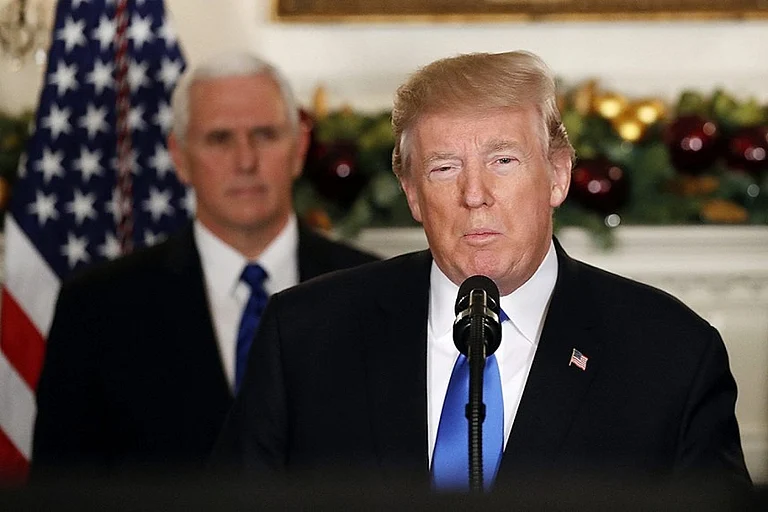Trump orders 500 National Guard troops to Chicago despite objections from local leaders.
President calls for arrest of Mayor Johnson and Governor Pritzker over immigration enforcement disputes.
Protests, legal challenges, and public opposition mount as troop deployments expand nationwide.
Trump Deploys National Guard To Chicago, Calls For Jailing Of Mayor And Governor
President Donald Trump orders 500 National Guard troops to Chicago amid political backlash, protests, and ongoing legal battles over immigration enforcement.
Around 500 National Guard troops were deployed near Chicago on Wednesday under orders from President Donald Trump, even as Mayor Brandon Johnson and Governor JB Pritzker condemned the move as an unnecessary militarisation of the city.
According to Reuters, roughly 200 soldiers from Texas and 300 from Illinois had gathered in the Chicago area and were positioned to protect federal personnel, including Immigration and Customs Enforcement agents, and federal property.
Trump accused Johnson and Pritzker of failing to protect ICE officers and called for both to be jailed, though neither official has been accused of criminal wrongdoing. “Chicago Mayor should be in jail for failing to protect ICE Officers! Governor Pritzker also!” Trump wrote on social media.
Johnson, who signed an executive order this week creating an “ICE Free Zone” that prohibits federal immigration agents from using city property, rejected the president’s demand. “This is not the first time Trump has tried to have a Black man unjustly arrested. I’m not going anywhere,” he wrote on social media.
Pritzker, a potential 2028 Democratic presidential candidate, likewise said he would not back down. “Trump is now calling for the arrest of elected representatives checking his power. What else is left on the path to full-blown authoritarianism?” he said.
Reuters reported that the deployment follows weeks of tension between federal officers and local authorities over immigration enforcement. While the Trump administration has warned of lawless and violent protests in cities including Chicago and Portland, demonstrations over immigration policy have generally been limited and largely peaceful.
Several hundred people marched in downtown Chicago on Wednesday evening to protest the troop deployment. Chanting “Todos somos Silverio” — “We are all Silverio” — protesters invoked the fatal shooting of immigrant Silverio Villegas Gonzalez by ICE agents in a Chicago suburb in September. Police records and witness accounts of that shooting reportedly differ from the Department of Homeland Security’s account, and the lawyer for a woman shot by ICE agents said video evidence contradicts some official assertions.
Outside the protest areas, downtown commuter traffic was largely normal, though residents noted frequent helicopter patrols overhead, a visible presence since federal incursions began last month. In Latino and Black neighbourhoods where immigration agents have been most active, business owners and residents have come out to criticise what they view as mistreatment of their neighbours by federal officers.
At a White House event on Wednesday, Homeland Security Secretary Kristi Noem defended the presence of federal officers, saying they had come under threat “on a regular basis” in cities such as Portland and Chicago. “Any elected official that allows this to happen ... should absolutely be prosecuted, in my opinion,” she added after Trump redirected a reporter’s question about arresting Democratic leaders to her.
Legal limits on the federal deployments have already been tested in court. Reuters reported that federal judges have imposed some restrictions where governors objected, though the administration has signalled it could seek to invoke anti-insurrection authorities to sidestep court orders. Two hearings scheduled for Thursday will further test those moves: an Illinois federal judge will consider whether to temporarily halt the National Guard deployment to Chicago, and a California appeals court will review the administration’s appeal over a decision blocking troop movements to Portland.
Separately, a federal judge found that ICE had violated a 2022 agreement limiting the agency’s ability in several Midwestern states to make arrests without warrants, a ruling that could curb some of ICE’s recent tactics.
Trump’s call to imprison the two elected officials comes as another political development unfolded: former FBI director James Comey pleaded not guilty to criminal charges. The administration has frequently called for jailing political opponents, but Comey is the first of those high-profile figures to face prosecution, according to the material provided.
Despite legal challenges and public opposition, the president has suggested sending troops to additional U.S. cities, describing such deployments as possible “training grounds” for the armed forces. A Reuters/Ipsos poll released on Wednesday found most Americans oppose National Guard deployments to domestic cities in the absence of an external threat.
(With inputs from Reuters)


